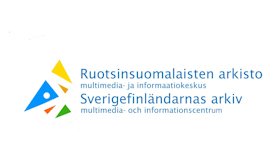
Ruotsinsuomalaisten arkisto | The Archives of Sweden Finns

ORGANISATION
Ruotsinsuomalaisten arkisto | The Archives of the Sweden Finns
The task of The Archives of the Sweden Finns is to collect and retain documents and records related to the history and life of Finns in Sweden. The archive also supports Sweden Finnish culture, research and education. The archive also works with gathering and spreading information about the Sweden Finnish minority. Information about the archive, its collections and activities, can be found on their webpage. Some of the materials of the archive, like photographs and life stories, can also be studied there.
The Archives of the Sweden Finns was founded in 1977 and the members are Swedish and Sweden Finnish organisations, companies, networks and private citizens of Sweden.
The Archives of the Sweden Finns cooperates with The Swedish National Archives (Riksarkivet) and with the City Archives of Eskilstuna (Eskilstuna stadsarkiv). Eskilstuna is one of the main cities, in which a large proportion of the population has its roots in Finland.

COUNTRY
Sweden

TYPE OF ORGANISATION
Associate Member

WEBSITE

INFORMATION ABOUT THE LANGUAGE
Finnish
Special commission to teach the language and to provide teacher subject education; education in (in Finnish) and about (initially in Swedish) the language, literature, culture and didactics, from basic level to Ph.D. level.
In official use in the administrative area of Finnish (64 municipalities 2018, and County Boards and County Councils of the regions in which these municipalities are situated). Right to use Finnish in contact with specific authorities. Within the administrative area municipalities the use of Finnish in public and official situations is the most extensive ever in Sweden. Special provisions for pre-school in the administrative area of Finnish. Right to mother tongue education in primary school, but this today comprises of on average 1 hr/week. Bilingual education/classes in a handful of municipalities, and in five independent bilingual primary schools (4 in the Stockholm region), which also have their own pre-schools connected to them. Own public service radio channel, daily news on public tv, plus some additional documentaries and children’s programmes. Educational radio/tv is commissioned to create educational programs for schools, in cooperation with the speakers. Own weekly newspaper, other nische magazines, independent book printing cooperative company. Finnish-language theatre.
